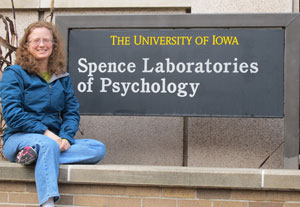Member Article
A Moving Research Story

Teresa Treat poses with The University of Iowa Science Laboratories of Psychology.
Every once in a while, you pick up the phone, and something extraordinary happens. On March 3rd, Alan Christensen, Chair of the Psychology Department at Iowa, called to ask if I’d be interested in interviewing for a position. On July 6th, I crammed clothing and my favorite statistics books into my car and made the move to Iowa City. Iowa was high on my “Top-10” list of clinical science programs and psychology departments, so this was a thrilling opportunity to pursue a dream job. Knowing that Janet Spence’s journey from Yale to Iowa had worked out so very well in 1946 also spurred me onward. Nonetheless, the move to Iowa presented quite an array of stressors and uncertainties. It also meant departing Yale’s Psychology Department, my highly stimulating and supportive academic home for the first nine years of my faculty career.
I deliberately choose to capitalize on the numerous opportunities afforded by departmental transitions to re-examine and re-create myself and my career. Moving to another university frees us at least temporarily of habitual or institutional constraints in our models of research, teaching, service, and nonacademic activities, so taking stock in the midst of chaos is well worth the time and effort.
My top priority was a critical examination of my research program, particularly re-specifying goals for various time horizons and evaluating what needed to change in order for me to remain on track. For the first time, I considered what I hoped to accomplish by the end of my career and the viability of my prospects to do so, a rather sobering exercise that further motivated my efforts to hone my research agenda and streamline the way I run my shop.
My research program in quantitative clinical-cognitive science aims to apply the theoretical, measurement, and computational models of contemporary cognitive science to facilitate understanding, assessment, and modification of the role of cognitive processing in clinical phenomena. For example, much of my work examines young women’s processing of other women’s body-size and facial-affect information, with implications for our understanding of disordered eating; as well as young men’s processing of college-aged women’s affect, clothing style, and attractiveness, with implications for our understanding of sexual aggression between acquaintances
My collaborators and I have established that both clinical phenomena are characterized by impoverished affective processing across multiple component cognitive processes (e.g., attention, memory, learning, and decision-making). More recently, we have begun developing cognitive-training methods that ultimately might be used to enhance affective processing in prevention or intervention contexts on college campuses, an important long-term goal of my translational research program. Moving to the University of Iowa, with its large and diverse undergraduate population, will make it easier to efficiently address these more applied research questions. The close proximity of faculty colleagues with expertise in psychometrics, vision science, and computational modeling will also prove invaluable to both my students and myself.
I find both teaching and service to be highly stimulating and rewarding, but attainment of my research goals necessitated re-allocation of my time and energy across research, teaching, and service activities. It has been fairly straightforward to articulate my teaching and service priorities, but adhering to them will require more extensive and disciplined effort to set limits and maximize efficiency than I have previously employed.
The time also seemed ripe to consider what work-life balance means to a newly tenured faculty member for whom the advancement of clinical science — and psychological science, more generally — is an invigorating and fulfilling vocation. Making time for and enjoying nonacademic activities always have been very important to me, whether spending time with friends and family, engaging in outdoor adventures, making music and cooking, or giving back to the community in which I live. But realizing an optimal balance between the academic and nonacademic portions of my schedule clearly will be crucial as I settle into life in Iowa City.
In the weeks before departing, I had the opportunity to say thank you to colleagues and friends at Yale. We all stand on the shoulders of senior colleagues, of course, and mentorship is no less important to a junior faculty member than to a graduate student or postdoc. Thus, I welcomed the opportunity to acknowledge the tremendous impact that Susan Nolen-Hoeksema, Kelly Brownell, Peter Salovey, and Marcia Johnson had on me as their junior colleague. Fortunately, although I wouldn’t be seeing them as often as before, I knew that I could count on reuniting time and again in the small world of academia. And I knew that they would continue to root for me and be available to provide wise counsel along the way to the new Hawkeye in their midst.





APS regularly opens certain online articles for discussion on our website. Effective February 2021, you must be a logged-in APS member to post comments. By posting a comment, you agree to our Community Guidelines and the display of your profile information, including your name and affiliation. Any opinions, findings, conclusions, or recommendations present in article comments are those of the writers and do not necessarily reflect the views of APS or the article’s author. For more information, please see our Community Guidelines.
Please login with your APS account to comment.